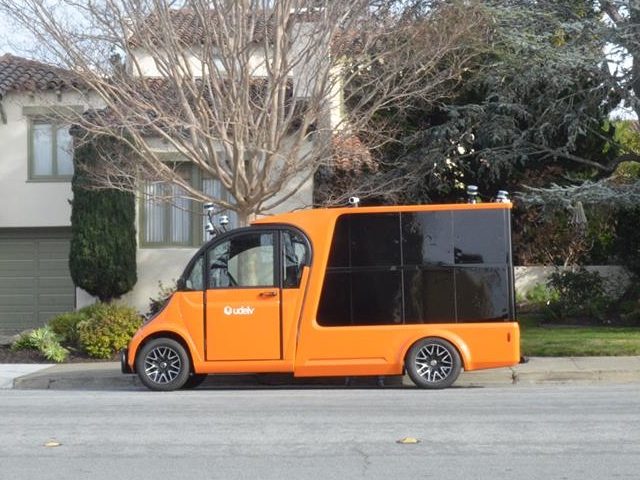Silicon Valley’s Udelv made history by piloting the first driverless retail grocery delivery service in America on Jan. 30.
The very chic Draeger’s market in San Mateo seems like the perfect fit for Udelv’s autonomous (self-driving) grocery delivery service. Just north of Stanford University and in the heart of the greatest concentration of tech nouveau riche billionaires on the planet, Draeger’s customers are not price conscious, but expect concierge-style gratification.
The store’s first floor features delicacies like truffles, green garlic, morel mushrooms, sweetbreads, duck, beef tongue, real caviar, jamon serrano, quail eggs, squid ink, and balsamic vinegar tradizionale. Upstairs offers a wide array of exotic cookware, and a premier rated cooking school that offers pricey in-store or even pricier at-home classes.
Udelv’s bright orange step vans provide what the company calls “last-mile” all-electric cartage for short haul solutions. The company is licensed to operate one autonomous vehicle, but still provides a stand-by emergency operator as required under California law.
The company claims to be equipping its vans with true level-four autonomous driving features, such as an array of rooftop lidar and camera sensors. Experts view the technological hurdles to handle the high number of autonomous stops and starts, plus the interface between the commercial customer loading and retail customer unloading, as very substantial.
The company’s vans utilize an GEM eL XD electric truck chassis, with an 8.7 horsepower e-motor that has a top 25 miles-per-hour top speed. Vans can travel about 60 miles and make about 40 local stops on a single charge of the car’s 20-kilowatt battery pack. That is not impressive, by Tesla long-haul standards, but the utilitarian design allows deliveries for a commercially disruptive operating cost of just five cents per mile.
Udelv has partnered with Motivo Engineering to build out cargo areas that can efficiently transport 700 pounds of groceries, allocated across 18 secured cubicles of various sizes.
Retail customers interact directly with the compartments through an iOS app. When products are ordered online, a random code is assigned to the customer. When the van pulls up outside their home or business, the customer taps in his or her code number. The van’s back door unlocks, and the appropriate compartment opens for cargo retrieval.
Udelv has partnered with last-mile shipping provider Delivery Guys for its commercial proof-of-concept demonstration, which will run through the summer. The company believes that with its self-driving vans slashing local shipping costs by up to 50 percent, it can attract the business of big players — including Amazon, UPS, and FedEx.
McKinsey & Company issued a report in late 2016 titled: “Parcel Delivery The Future of Last Mile.” It identified the current $85 billion last-mile parcel delivery sector as an industry ready for mass disruption. McKinsey expects that the introduction of drones and autonomous ground vehicles over the next decade will drive down costs by 50 percent and drive up utilization by 500 percent.

COMMENTS
Please let us know if you're having issues with commenting.